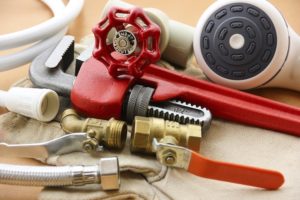
Frozen pipes are a problem on their own since they stop water from flowing in your home or business.
Winter is finally here and it’s time to settle in for the long cold months while we wait for spring. One of the most troublesome problems that winter can cause is frozen pipes. Frozen pipes are a problem on their own since they stop water from flowing in your home or business, but they can also often lead to burst pipes and extensive water damage. Thankfully, there are plenty of winter plumbing tasks you can do to prevent frozen pipes, including following these tips.
Keep A Slow Drip
Open one of your faucets to allow a very slow drip to run through the pipes if any of your pipes run through uninsulated areas. This may not keep your pipes from freezing, but it lessens the chance of burst pipes because the open faucet acts as a pressure release.
Insulate Exterior Elements
If you have outdoor spigots or any pipes that run outside or pass through uninsulated basements or crawl spaces, consider insulating them. You can insulate the space around them or insulate the pipes directly. There are also insulating domes available for covering spigots. Make sure that you remove any hoses from those spigots before the cold weather hits as well.
Maintain Consistent Temperatures
Another way to keep pipes from freezing during sub-zero temperatures is to keep your home at a consistent temperature. Set your thermostat to at least 55 degrees and don’t lower the temperatures at night. If you have any unoccupied rooms or buildings, check them periodically to make sure they’re not getting too cold. You should also open the doors to any cabinets and remove ceiling tiles in the basement so warmer room air can circulate through during the coldest snaps. Finally, you can consider using space heaters to warm areas that don’t receive heat from your central heating system, but do so safely and responsibly – unmonitored space heaters can potentially be dangerous and cause fires.
Shut Off All Water If There’s A Leak
If you do notice any signs of a leak, be prepared to turn the water off. If the pipe where you notice the leak has its own shutoff, you can shut off water to just the affected pipes. If it doesn’t, you may need to turn off the water to the whole building. This can cause big issues for homes and businesses, so it is helpful to have a plumber you trust on standby during these cold months.
Call Mahon Plumbing Today
If you still have more questions regarding your plumbing, we here at Mahon Plumbing are here to help. We have been serving the wider Baltimore area since 1994, so we have 25 years of experience to back up our fantastic service! Call us at our Baltimore location at 410-766-8566 or our Pasadena location at 410-636-7944. Be sure to keep up with us on social media by following us on Facebook or Twitter.
